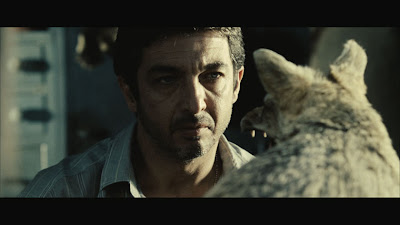 Fabián Bielinsky's second and (given the director's untimely death) final feature film, El aura, manages to combine various different kinds of suspense. As a thriller, that revolves around a scheme to rob a casino in a remote part of Argentine Patagonia, it draws us in to the intricacies of the criminal plot and its likely success. But the bigger mystery entails its central character, an anonymous Buenos Aires taxidermist played by the excellent Ricardo Darín (who also starred in Bielinsky's previous movie, Nueve reinas).
Fabián Bielinsky's second and (given the director's untimely death) final feature film, El aura, manages to combine various different kinds of suspense. As a thriller, that revolves around a scheme to rob a casino in a remote part of Argentine Patagonia, it draws us in to the intricacies of the criminal plot and its likely success. But the bigger mystery entails its central character, an anonymous Buenos Aires taxidermist played by the excellent Ricardo Darín (who also starred in Bielinsky's previous movie, Nueve reinas).Darín's character wanders into the casino heist by accident, but soon finds himself trying to convince the other members of the gang that he is an integral part of the plan. So a double deception is at work: the thieves' bid to deceive the casino, and the taxidermists' bid to pull the wool over the criminals' eyes. And if one plot fails, then so will the other. The interloper from the capital has to be always thinking on his feet, relying on his powers of observation, recall, and improvisation. He has often dreamed of being part of a caper like this; now thrust into one that is not of his own devising, yet cast as the unlikely ringleader, he has to prove that he can live up to the cool and calculated persona he plays in his dreams.
But as the movie continues, its haunting and even spooky quality, its slow lingering camerawork and plaintive musical soundtrack, give the impression of a dreamlike quality cast over the entire operation. Perhaps the fantasy lived out by this otherwise unassuming craftsman is indeed only that: another of his fantasies.
A commentator on the movie's IMDB message board notes that El aura is strangely reminiscent of Jorge Luis Borges's acclaimed short story "El Sur". (There's added weight to this notion in that Bielinsky's first film, a short entitled La espera, was an adaption of a Borges story.) In "El Sur" ("The South"), a Buenos Aires librarian finds himself in the midst of a violent escapade, complete with gauchos and knife-fights, in a godforsaken town somewhere far to the South. His journey to the provinces is also a trip to the rough-hewn frontier life that characterized Argentine society in the semi-mythical past in texts from Sarmiento's Facundo onwards. It is a voyage to his country's cultural unconscious that also, the reader gradually comes to suspect, is played out in the character's own unconscious as he lies, unheroically dying of an infected scratch on his forehead, on a hospital operating table.
El aura's protagonist, likewise, has a relatively minor medical condition: he suffers from epileptic fits, petits mals, in which he blacks out for a few minutes or seconds. As a fit comes on him, moreover, he briefly enters a state of altered consciousness that (he tells us) is termed "the aura." As he describes the experience, "It's horrible and it's perfect. Because during those few seconds, you're free. There's no choice; there's no alternative; nothing for you to decide. Everything tightens up, gets narrower...and you surrender yourself." Is it possible that the entire trip to the Patagonian South, and the rich panoply of shady villains and victims that we see there, are conjured up in this penumbra between consciousness and unconsciousness, between freedom and necessity? That the taxidermist, who works with dead objects but seeks to give them the sense of life, a dramatic placement in vivid museum-bound dioramas, has also animated the movie's suspenseful plot from the moribund elements that surround him in his workshop?
The film's final shot shows us a dog who is initially as still as the stuffed animals that surround him before finally the blink of a canine eye (not unlike the similar movement in Chris Marker's La jetée) seems to confirm the reality of all we have just seen. Or perhaps it just reinforces the power of the fantasy that spins its narrative web in the aura between dreaming and waking.

See also: El aura official site.
See also: "El Sur" in Spanish (.pdf).
YouTube Link: the movie trailer.
No comments:
Post a Comment